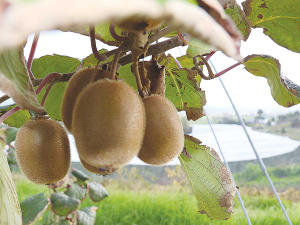MPI Hails Kiwifruit Boom as Horticulture Revenue Surges Past $9 Billion
Ministry for Primary Industries (MPI) Director General Ray Smith is giving a big shout-out to the horticulture sector, especially kiwifruit.
 Along the east coast, maize has been a crop grown by Māori but now kiwifruit and other high value crops are starting to appear.
Along the east coast, maize has been a crop grown by Māori but now kiwifruit and other high value crops are starting to appear.
The success of some of the early Māori adopters in the kiwifruit industry is starting to catch on.
While Te Kaha may be a hub, other trusts and incorporations are also taking the plunge and moving into kiwifruit. Drive from Opotiki right up to Te Araroa near Hicks Bay, and you will see a mix of large and small kiwifruit orchards tucked away on the coastal flats and rolling hillsides - many of them covered.
In many cases, Māori trusts are incorporating kiwifruit into their overall operations. For example, Tunapahore B2A Incorporation at Hawai has 5ha of kiwifruit alongside its 385-cow dairy farm.
Along the east coast, maize has been a crop grown by Māori or by others on land leased to them by Māori. But now kiwifruit and other high values crops are starting to appear, says Anaru Timutimu.
"It's daylight between the type of returns you were getting," he told Rural News. "In the case of maize, you might get $1,500 per hectare, but fully developed orchards can now attain gross returns of $200,000 plus per hectare."
Timutimu says this means more jobs for young Māori and a cash injection for whanau and the local economy.
"There is a distinct advantage in Te Kaha with their mild micro climate, which means their fruit matures earlier than other regions, attracting a premium price for early start," he says.
This change is also being observed by Peter Andrew, a director of AgFirst - based in Gisborne. He says there is a lot of change taking place around the whole East Coast, with some farmland being converted to forests, but he's also noticed a big shift to horticulture.
Andrew says Māori are not that keen on forestry given the bad experiences they have had; horticulture seems to have more appeal. He says there is a lot more horticultural development around Gisborn itself with high value crops such as kiwifruit and apples pushing crops like maize to less productive land.
He is also noticing Māori diversifying their land use. He says there is a significant blueberry operation at Tolaga Bay.
Andrew believes the other advantage with horticulture is that it is often better use of water because it is being used on high value crops.
Voting has started for the renewal of DairyNZ's milksolids levy.
The most successful catchment groups in NZ are those that have 'a source to sea' approach.
Associate Agriculture Minister and Manawatu dairy farmer Andrew Hoggard says the free trade agreement (FTA) negotiated with India is not a bad deal and his party, Act, will support it when it goes before Parliament.
Newly released data from Environment Canterbury (ECan) Farm Environment Plan (FEP) audits are showing a dramatic lift in environmental performance across the region.
A solid recovery of global dairy prices this year makes a $9.50/kgMS milk price almost a shoo-in for this season.
As New Zealand marks the United Nations’ International Year of the Woman Farmer 2026 (IYWF 2026), industry leaders are challenging the misconception that women only support farming.

OPINION: Here w go: the election date is set for November 7 and the politicians are out of the gate…
OPINION: ECan data was released a few days ago showing Canterbury farmers have made “giant strides on environmental performance”.